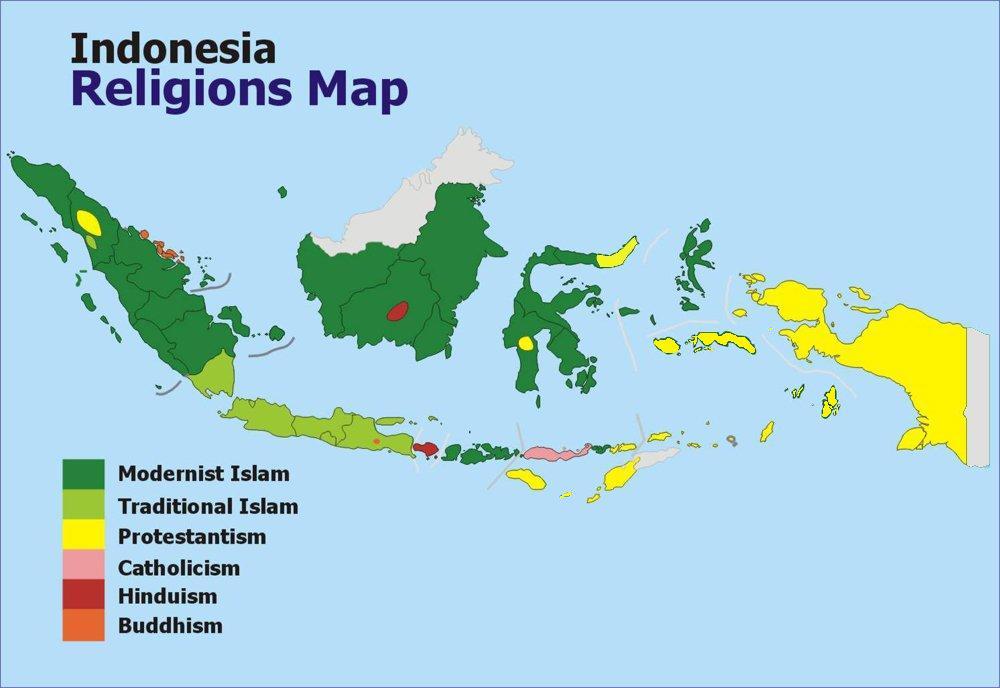Indonesia, an archipelagic nation sprawling across Southeast Asia, is the world’s largest Muslim-majority country. Approximately 87% of its over 270 million inhabitants identify as Muslim, while a myriad of other faiths coexist within its vibrant tapestry of cultures. This article delves into the implications and dynamics of Islam’s predominance in Indonesia from a Christian perspective, examining the intersections of faith, culture, and social practice.
Islam arrived in Indonesia mainly through trade, with Muslim merchants establishing settlements and disseminating their beliefs. The process of Islamization was largely peaceful, promoting syncretism with local traditions rather than outright conversion. Consequently, Indonesian Islam bears distinct characteristics; it often intertwines with pre-existing animistic and Hindu-Buddhist beliefs, resulting in a unique form of faith expression that manifests during various rituals and cultural celebrations.
Christianity, while a minority, plays an essential role in Indonesia’s religious landscape. Roughly 10% of Indonesians identify as Christian, with the faith predominantly concentrated in regions such as North Sulawesi and the Nusa Tenggara islands. The interaction between the two religions is complex, characterized by both harmony and tension.
Within Muslim-majority regions, Christians often navigate a delicate balance between maintaining their faith and adhering to societal norms. The presence of Christian communities in Indonesia has introduced diverse theological perspectives, fostering an environment ripe for interfaith dialogue. This dialogue is essential in promoting an understanding of religious tolerance and coexistence, especially in a country where traditional values hold significant sway over daily life.
Indonesia’s Pancasila, the foundational philosophical framework of the nation, emphasizes the belief in one God and acknowledges the country’s pluralistic nature, allowing for various religious practices. This state ideology has facilitated an environment where different faiths, including Christianity, can coexist. Yet, despite this official recognition, Christians have faced challenges, including legislative restrictions, social ostracism, and occasional violence. Crucially, these challenges often stem from local interpretations of Islamic law and cultural attitudes towards non-Muslims.
In response to these challenges, many Indonesian Christians engage actively in social and humanitarian efforts, promoting peace and inclusivity. Religious leaders and laypersons collaborate on initiatives aimed at bridging divides and fostering understanding. Church groups frequently host community events, interfaith celebrations, and charity drives, thereby strengthening relationships with their Muslim neighbors and working towards a more harmonious society.
From a Christian theological viewpoint, engagement with Islam invites contemplation on various doctrinal points. Christians are encouraged to consider the nature of God and salvation. The Islamic understanding of Allah as an indivisible entity raises essential questions regarding the Christian doctrine of the Trinity. This necessitates theological dialogues that can affirm differences while also recognizing common ground, such as the shared reverence for figures like Jesus, who is honored as a prophet in Islam.
Furthermore, the worship practices of Christians in Indonesia demonstrate resilience and adaptability amidst the prevailing Islamic culture. Traditional hymns may intertwine with local instruments and melodies, reflecting the distinct musical heritage of the region. These adaptations are not mere cultural appropriations; they symbolize the intricate dance between preserving one’s identity and embracing local customs.
The narrative of Indonesian Christianity also encapsulates a broader story of religious identity formation. Many converts from Islam to Christianity cite personal experiences of revelation, often describing transformative encounters that led to their faith transition. This phenomenon highlights a paradoxical reality: while Indonesia is a bastion of Islamic faith, it also serves as an arena for genuine theological exploration and conversion.
Moreover, the implications of being a Christian in a Muslim-majority society extend to socio-political dimensions. Political representation remains skewed, with Muslims predominantly holding positions of power. This disparity can affect governance policies, which occasionally marginalize the interests of religious minorities. Thus, Christians in Indonesia often find themselves advocating for their rights within a framework that, while inclusive, can be nuanced by local political sentiments and realities.
In the quest to navigate these challenges, the role of education becomes imperative. Christian institutions play a pivotal role in fostering theological education and training leaders who can engage thoughtfully with the broader religious community. More than mere religious instruction, these educational endeavors cultivate critical thinking, equipping future leaders to address pressing social issues and advocate for justice and equality.
The tension between a Muslim majority and Christian minority fosters a unique sociocultural dynamic. Indonesian Christians are not merely passive observers; they are active participants in the ongoing dialogue about what it means to belong to a nation that prides itself on its religious diversity. Embracing this dual identity as both Indonesians and Christians, they contribute to the broader narrative of the nation, advocating for a future where faith transcends division.
Ultimately, Indonesia stands as a testament to the intricate interplay of religion and society, illustrating both the challenges and the opportunities inherent in a pluralistic landscape. The Christian perspective within this predominantly Muslim country seeks not only to affirm one’s faith but also to engage with others in meaningful ways, fostering a sense of community built on respect, understanding, and compassion. This ongoing journey reflects a commitment to live out the tenets of faith while navigating the complexities of cultural and religious diversity.



